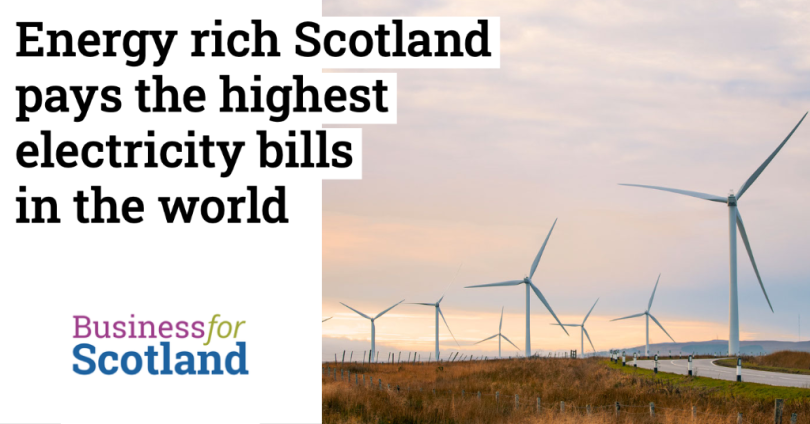Energy has become a major issue pushing Scotland towards independence. People across Scotland can see that they are being ripped off – they pay the highest electricity bills in the world despite living in an energy-rich country.
“Scotland has the energy – it just needs the power”, MP Stephen Flynn told Westminster last week. He stated that the average bill in Scotland is not £2,500 a year as it is in the UK – it is £3,300 per year. That is despite the fact that Scotland produces six times the amount of gas we consume and that 97.4% of our gross electricity consumption comes from low-cost renewable sources 104.
In answer, PM Rishi Sunak talked about the government’s energy price cap – which is being reduced in April. There was no recognition or acknowledgment of the higher bills Scots face. There was no recognition either of the fact that England’s reliance on Scottish energy exports is increasing (up 67% since 2000), with Scotland exporting 39% of its electricity to England and Northern Ireland in 2019 101.
The growing anger over how Scotland is made to dance to the UK’s tune over energy policy is encouraging many Scots to feel a sense of urgency in demanding and getting independence.
The UK government has made political choices over energy
Under current devolution arrangements, the power to regulate the energy market lies firmly with Westminster. The way they have chosen to do it has been ideologically driven and political. Arms-length bodies like Ofgem are only there to enforce the UK government’s rules. Those rules are bad for Scotland and for the Scottish people – but that doesn’t much matter to the UK government, as it is not elected by the people of Scotland.
The UK government’s choices are not Scotland’s choices:
- They privatised the national grid which is now owned by Transco
- They gradually privatised all the UK’s publicly-owned gas and electricity boards
- They created a virtually unregulated “free market” for energy companies and when 29 went bust, they decided to claw back through energy bills citizens’ money which was lost due to regulatory failure
- They charge every household a levy to fund costly nuclear power, instead of investing in technologies that Scotland has world-beating expertise in, like tidal power
- They have failed to set the right market conditions to support supply chains in Scotland
- They have failed to set the right market conditions for energy storage, like pumped hydro, that Scotland has huge potential in
- They have failed to set the right market conditions to attract investment in green manufacturing, like electric car batteries or wind turbines
- They made it more lucrative for companies to import power from Europe than to build renewable facilities in Scotland
- They have failed to invest in insulation and energy conservation – and as Scotland’s budget largely depends on the “Barnett consequentials” a policy designed to suit England, that affects funding for these initiatives
- Energy analysts say that the lack of investment means the UK will likely miss the boat in terms of becoming a leader in the green economy
The way that the UK has managed energy policy punishes Scotland
- Scotland’s consumers are charged 50 percent more in standing charges to use electricity than most of England
- Scottish energy suppliers pay 10 times as much to connect to the National Grid – last year the Scottish Affairs Committee called for transmission charges and grid investment to be equally shared across the UK to help strengthen the Scottish renewables sector
- The National Grid has been starved of investment for decades, left configured around coal-fired power stations in the north of England
- The National Grid doesn’t have enough capacity to connect renewable energy to homes in Scotland – wind turbines have to turn off power or face fines much of the time
- Scotland is not allowed to operate as its own “node” which would give it the capacity to adjust consumption in a smart way through pricing, and to export energy to England at a different price from what domestic consumers pay
- There is not enough capacity to store energy in ways such as pumped hydro – although Scotland used to have world-leading technology in this area
Scotland’s bills are the highest in the world
Energy Action Scotland (EAS) analysed Scottish energy statistics, following the UK government’s “historic intervention” in the energy market and a pledge that average bills will not rise above £2,500 for the next two years. The analysis, making use of official Scottish energy statistics, shows that across Scotland the typical dual-fuel bill has gone up from £1,375.97 last year to £3,302.45 as of October 1st.
Rural areas are worst hit – as they don’t have access to the gas network which is priced more cheaply. Argyll and Bute face the highest costs of the 32 local authority areas in Scotland with average annual dual-fuel bills soaring from £1,842.06 in April last year to £4,421.49 this month. Residents of Comhairle nan Eilean Siar, the council that covers the Western Isles, face the second highest rises with average prices soaring from £1,754.80 last year to £4,212.57 now. Even in the cheapest area Glasgow City, the least expensive local authority area for bills in Scotland, the average bill will be £2,672.47. 
An international comparison shows a growing gulf between the UK and other countries
A study released last month looked at Government data on electricity and gas prices from the past five years to analyse the impact of the worsening cost of living crisis and discover which countries have had the biggest year-on-year increase in energy prices. The data, compiled by BOXT, was released UK’s energy price cap was recently raised from 28p to 34p per kWh.
The Republic of Ireland has the second highest electricity cost, paying 18.99p per kWh. That’s 53 per cent more expensive than the average of these 24 countries. However, prices are slightly more affordable when it comes to gas in Ireland, which stands at 5.21p per kWh.
The countries with the highest electricity prices
| Rank | Country | Price – pence per kWh |
| 1 | United Kingdom | 19.31 |
| 2 | Ireland | 18.99 |
| 3 | Spain | 18.51 |
| 3 | Belgium | 16.34 |
| 3 | Japan | 15.64 |
| 6 | Australia | 14.01 |
| 7 | Switzerland | 14.00 |
| 8 | Netherlands | 13.98 |
| 9 | Germany | 13.58 |
| 10 | Czech Republic | 12.69 |
But KWH is not a guide to what people pay. Most European countries are providing a great deal more help than the UK government is. For example, the Norwegian government launched a power bill support scheme earlier this year, which covers 80% of the portion of the electricity price that exceeds NOK 0.70 (6p) per kWh. From October to December of 2022, that percentage will jump to 90%.
In Germany, from January, gas and electricity bills will be capped. Government subsidies will allow households and small businesses to pay a lower rate for 80% of the gas they use and 70% of their electricity consumption.
Conclusion
Scotland is literally powerless to do anything about the way that Westminster decides to plan and regulate the UK’s energy sector. The UK government does that in line with political choices that are very different from the ones Scots make time after time at the ballot box. It will be very difficult for Scotland to rebuild the kind of capacity it lost through privatistion in the Thatcher years – and it is not something that can realistically be tackled without independence.
Anger over the way Scotland’s energy potential is being squandered is fueling a drive towards independence. People can see how Norway benefited from oil and gas and where it is now, economically, compared to Scotland. Scotland was fooled once – it doesn’t want to be fooled twice.
Scotland should operate as its own node within the UK. The Scottish government should be able to control and regulate the energy market, including the national grid. It should be able to set the right market incentives for the kind of technologies Scotland needs and which will help the country to achieve ambitious net-zero targets.
The only way to achieve those powers is through independence.










Great piece, but feel you are missing a trick with the potential for Green Hydrogen and a Hydrogen economy in Scotland. Similar story re wind turbines and tidal turbines. No serious investment whilst the rest of the world is moving fast. Likely we’ll miss out on manufacturing electrolysers and a self sufficient supply chain. Hydrogen offers great potential for islands and peripheral communities , localised grids , a secondary power source when severe weather intervenes. It also has massive industrial and domestic heating potential. Don’t put all our eggs in the electricity basket